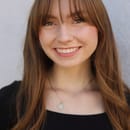I remember my first really bad zit. I was in sixth grade, and it was this gross, pus-filled spot right in the crook of my nose. I didn’t really know what to do about it, and I wasn’t wearing make-up at that age. When I got home, my mom said something along the lines of, “You can pop that, you know.” In that moment, I learned that acne was something to hide, something I needed to change about myself.
For the next five years, a cascade of pus-filled bumps, red-toned skin, and scars followed.
Throughout middle school, I really didn’t know what to do about my skin. I remember spending a significant amount of time staring in the mirror, just thinking about how if this one thing was fixed about me. I believed that I would be so much more beautiful, and finally be able to like myself if it just went away. It became the only thing I ever saw about myself, and it became the thing I worried that everyone else was seeing too. And they did! I had friends call me, from behind my back, pizza face. One time, a woman who I didn’t know at all approached me in a Noah’s Bagels and asked me what treatments I had tried. She advised me to just start “washing my face” multiple times a day. (Thanks, very helpful!) Even my dermatologist picked on me for it. She rarely listened to my concerns about my acne and made me feel like an incompotent child. In one instance, after being prescribed medications that I accidentally used incorrectly (due to her poor instruction), she laughed at me and asked incredulously, “Why would you do it like that!” Needless to say, I avoided seeing her as much as possible.
By the end of middle school and the beginning of high school, my acne had gotten better but was by no means completely gone. I constantly covered my face with make-up, and eventually felt like I couldn’t go to school without foundation. In class, I’d pull my sleeve over my hand and cover my face. And I was always, always picking at my skin. (I know everyone says this, but really don’t do it, especially when you have cystic acne.)
And then, it got so much worse.
The first semester of my junior year of high school, for whatever reason, my acne moved from being a mostly cosmetic concern to a deeply painful skin disease. I could feel the infection underneath my skin, which got so bad I imagined elaborate scenarios in which I could peel off the top layer of my skin to make it stop. My face was oily, sore, and would even flake off if I wiped my face with my sleeve. It was not a vibe, to put it lightly.
Due to my bad experiences with my dermatologist in the past, my mom found an esthetician for me to see, someone who specializes in more natural ways to combat acne, including facials and a holistic skin care routine. For years, I had been told I had oily skin, and that was the reason I had acne. Within the first five minutes of seeing my esthetician, they examined my skin and told me I had been lied to! I actually had dry skin, which was overproducing oil to try to compensate for the dryness. They immediately put me on different moisturizers and serums, and my skin felt like it could breath for the first time in years. Although this might seem like a minor discovery, for me, it completely changed the way I saw my acne. For years, because of what I had been told and the healthcare professionals I interacted with, I felt like my acne was my fault: My skin was oily, and therefore unhealthy and unclean. When in reality, it was the healthcare industry’s fault. Before my esthetician, no one even took the time to examine my skin for more than three seconds, or tried to build enough trust with me as a patient to really understand what I was dealing with. Of course my skin wasn’t getting better!
I continued to see my esthetician for about a year and a half, and while my acne did improve, it still had a long way to go by the time I stopped seeing them. But what was so important about that time was the results I saw underneath the surface. I finally started going places without make-up on, and I took more care of my skin while learning how to have patience with myself, enabling me to see a life that wasn’t entirely defined by my acne.
At the beginning of my senior year in high school, I decided it was time to try dermatology again, as it became obvious that my skin needed medical intervention in order to really heal. I was lucky enough to be able to see a new dermatologist, who put me on an antibiotic and Epiduo — a topical skin ointment — while I continued the holistic practices I had learned from my esthetician. Due to the way these treatments are designed, I ended up purging for about three months, which means that my skin pushed all the infection up to the surface, leading to extreme breakouts.
That’s the thing about acne: it has to get much, much worse before it gets better.

Since my skin was so bad, I stopped wearing make-up entirely (it honestly became too painful for me to wear it the entire day). While it was nerve-wracking at first, and there are some rough photos that exist of me at that time, breaking out like that really taught me how to feel beautiful, even if I didn’t necessarily “look” beautiful. I began to notice things I liked about myself without makeup: my eye shape, my bone structure, my eyebrows. I took extra effort in my style and hair to boost my confidence. And when my skin was ready to wear make-up again, I had a much healthier relationship with it. I was able to use make-up as a source of fun and creativity rather than a way to hide.
Now, over a year later, my skin looks and feels much healthier. I never have a completely clear face, but I no longer have cystic infections underneath my skin, my scarring has gone down, and it’s no longer the first thing I see in the mirror. And most importantly, I think my face is beautiful with or without makeup.
I want to recognize that through all of this, I was very lucky to have the financial resources to support my skin — something that is inextricably linked to my race and class privilege. This is why we need to rethink the way we look at skincare. In my case, and in so many other cases, acne wasn’t just a pimple that popped up around my time of the month, but a deep-rooted infection that changed the way I felt and acted. Everyone struggling with acne should be given the resources that I had, and I hope that as there is a continued push for universal healthcare, we can also reimagine our healthcare system to be holistic in nature. After all, everyone deserves to feel confident in their own skin.



